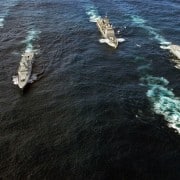|
Getting your Trinity Audio player ready...
|
The Arms Procurement Commission wrapped up at the end of June, after closing arguments had been presented by the interested parties that testified. In this three-part series, we summarise closing arguments from the evidence leaders, the government departments involved, and the arms dealers.
Closing arguments: the evidence leaders
Closing arguments: the arms suppliers
By Lee-Ann Alfreds
There was no impropriety or corruption in South Africa’s multi-billion rand arms deal.
Moreover, the government was not irrational when it undertook the massive deal in the face of other social demands, and the equipment purchased is being well utilised.
This was the closing submissions of the inter-ministerial committee (IMC), which was charged by Cabinet to oversee the procurement and make recommendations to Cabinet, and the Department of Defence to the Arms Procurement Commission. Public hearings ended at the end of June, and the final report is to be submitted to President Jacob Zuma by the end of the year.
In its closing submission, the committee – which was headed by then deputy president Thabo Mbeki and included finance minister Trevor Manuel, trade and industry minister Alec Erwin and defence minister Joe Modise – dismissed allegations of corruption or impropriety in the deal.
“The members of the IMC unequivocally submit that there has been no evidence of wrongdoing on the part of any one of them or in relation to their collective functions.”
They pointed out that critics, who have alleged for years that the ANC and political heavyweights received kickbacks from the deal, had provided no evidence to support their claims.
“Not one of those critics was able to produce evidence of fraud, corruption, impropriety or irregularity in the decision-making process,” they argued. “The submission that we advance is that insofar as the critics of the SDPP (Strategic Defence Procurement Packages) programme tendered evidence that was based on allegations/suspicions/probabilities of impropriety/corruption, in the nature of commissions of enquiry, the facts and not conjecture is what is required.”
All constitutionally above board
 They insisted that buying the arms was in line with the constitutional imperative that the defence force be properly equipped to protect and defend South Africa, as the country’s military stock at the time was “obsolete and had to be replaced”.
They insisted that buying the arms was in line with the constitutional imperative that the defence force be properly equipped to protect and defend South Africa, as the country’s military stock at the time was “obsolete and had to be replaced”.
No decision was taken “without reference to cost”, they insisted in their submission.
“The testimony of President Mbeki on the aspect of affordability is that at no stage did the IMC take any decision without reference to cost. President Mbeki also confirmed under cross-examination that the affordability report was discussed by the IMC and by Cabinet, which latter body accepted the report. His testimony was that the whole procurement process was discussed within the context of the other national challenges.”
Cost-effective purchasing
In its 154-page submission, the Department of Defence (DoD) pointed out that contrary to allegations that that corruption was behind the selection of bidders, four of the six successful bids had been the cheapest.
“A noteworthy, but not frequently publicised fact, is that of the six items of equipment purchased under the SDPPs, four were the cheapest on offer.”
These were the Gripen fighter aircraft, the GSC Type 209 submarines, the Agusta light utility helicopters, and the Agusta Super Lynx helicopters.
“Given the evidence before this commission in relation to these four items, it would surprise the DoD if there were to be any suggestion during argument to the contrary,” the department pointed out.
It argued that while the purchase of Hawk fighter jets from BAE was not the cheapest option, it was the correct one.
The department argued that a two-tier system as initially conceptualised was “not in the best interests of the SAAF or the SANDF” because there was a huge gap between the new planes being acquired and the existing technology.
“It … became obvious that the SAAF had to revert to its three-tier approach, consisting of the Pilatus Astra as the basic trainer, followed by advance fighter training on the Lift (Lead Infighter Trainer), and then the graduation to the advanced light fighter (the Alfa).”
It argued that while the German Frigate Consortium’s corvettes “were not the cheapest on offer, they won the competition based on the financial and industrial scores”.
The DoD said GFC “thus ranked first in the evaluation, which would, barring exceptional considerations such as those that played a role with the Hawks, in itself justify the acquisition”.
Reckless and malicious accusations
“Notwithstanding this, there were allegations that the competition was marred by irregular political interference, and that the subcontracts awarded by the GFC in relation to the combat suite were fraudulently manipulated. These allegations emanate from a single source, Dr (Richard) Young. His allegations have been exposed as being reckless, malicious and lacking in merit.”
The department also refuted allegations that BAE had paid billions in kickbacks to secure the tender to supply Hawk fighter jets, saying: “In relation to the Hawks, there has been no indication that the contracts to procure them were tainted by improper influence. On the contrary, the evidence was overwhelming that the decision to acquire the Hawks was a properly-motivated, well-documented, strategic one in the best interests of the nation.”
The department also pointed out that despite claims that its acquisitions chief Chippy Shaik had solicited and received a $3-million bribe from ThyssenKrupp, no evidence had been presented to prove this. They argued it was all based on a claim by Young, a losing bidder.
All equipment is utilised
Regarding utilisation, the department argued the arms were being utilised “in accordance with the mandate and budgetary requirements of the DoD”.
The department did acknowledge that the equipment had in general not been used as much as had been envisioned. The extent of usage depends on defence force commitments as well as the budget to fulfil those commitments.
“Given that it is not possible to predict exactly what the obligations in any given year will entail, it is unsurprising that the actual utilisation of equipment may not always correspond with the utilisation planned at the outset.”
Meanwhile, in its submission the Department of Trade and Industry denied it had acted inappropriately in the way it awarded National Industrial Development Participation (NIP) points to winning bidders. It said the NIP policy was “sanctioned by this government in that, in as far as the department was concerned, those were constitutional. Further that, the evaluations and calculations, which were done and were presented before this commission were based on documentation and policy.”






